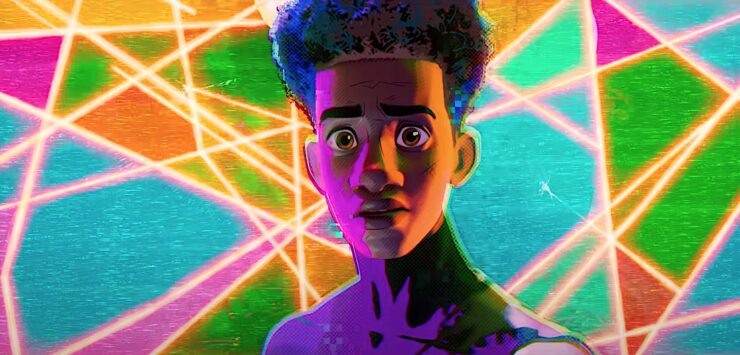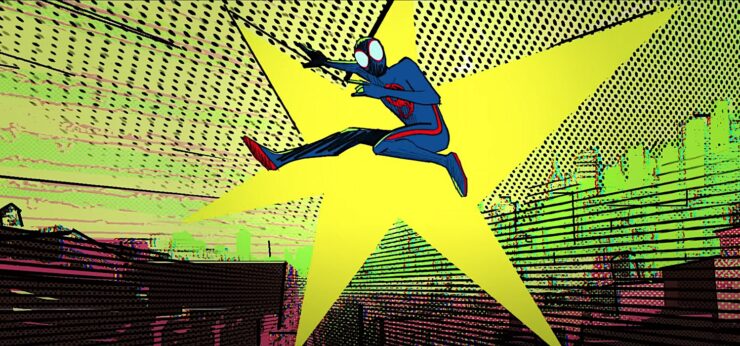I was having a conversation with my beloved colleague Renata Sweeney after watching Across the Spider-Verse, and we agreed that this film, more than most, matches how we think. I realized about halfway through the movie that watching it felt… good? This is hard to describe. It felt like my brain was being massaged. Like I could relax and allow all the stimuli to wash over me.
Apparently this is a hallmark of some types of ADHD, that a barrage of information and imagery feel more natural than slower-paced media. I’ve never been diagnosed with anything, but I thought it was interesting that at a certain point a few minutes into the film I felt a physical click, like a coin going in a slot, and was able to…where, ummm—it felt like the way I think was finally on the outside of my brain. For a few hours.
I’m thinking of this because there seem to be some people who feel like it’s Too Much. I’ve seen the words “exhausting”, and “psychedelic assault”, and (in a single paragraph!) “discomfortingly overstuffed” and “too much of a good thing”—as though that’s a thing we should complain about right now, in our world that so rarely gives us even a light dusting of good things.
Especially given that if there’s one thing that’s thin on the ground in a Spider-Man story, it’s too much of a good thing.
Is Across the Spider-Verse the first Spider-Movie that’s explicitly about how weird it is that Spidey has to suffer? The movie was such a joy to watch that it took me a bit to understand the the story it seems to be setting up. Specifically, the importance of “canon events”. These are events that change Spider-lives irrevocably. The fixed point in time, the fulcrum that makes them a hero in the first place, or changes the course of their heroism, or haunts their dreams, or gives them purpose. In most of these stories, it’s the one-two punch of a mentor figure saying a variation on “with great power, must come great responsibility”, paired with an unspeakable tragedy that the Spider-Person couldn’t prevent.
I agree with another beloved colleague, Emmet Asher-Perrin, that this concept is a bit undercooked, and I’m also a little confused by the specific canon events it cites. But I loved how it leaves room for all of us to make our own links and connections to other Spider-Man stories. The way Twitter exploded with screenshots of the Spider-Man Popsicle or Spider-Pig from The Simpsons Movie paired with the question “What was their canon event???” But the thing that really caught my eye was that the “canon event” leads to the belief that a lack of suffering will cause the death of the universe.

Hang on, join me for a tangent: one of the reasons I’m still not in therapy is that I need to find a therapist who will accept my deadpan humor. It’s not a defense mechanism or a coping mechanism or a fear response or a deflection, it’s the bedrock of how I experience reality. (And yeah, I know that sounds defensive. You see my dilemma.) But seriously, reality, in all its horror, is objectively hilarious. You just have to back up a little to see it sometimes. People drew pictures of land masses, then drew imaginary lines on those land masses, and now we kill each other because of them. Monty Python never came up with anything that good, and they gave us the Fish-Slapping Dance.
But back to canon events: I loved loved loved the sudden display of Uncle Ben Deaths. There have been so many points in my life when shitty things have rhymed with previous shitty things, or moments that felt worse precisely because I knew they were coming, and seeing all those Dead Bens like spokes on a wheel summed up that sense of mirroring exactly. Like Damian Hirst’s Death Explained, or the Boy with a Horse scene in Tarsem’s The Cell, or maybe even more brutally in Bryan Fuller’s Hannibal—but here rather than a shark or a horse or a person the thing being sliced into discrete pieces is grief itself.
We saw Uncle Aaron’s death in Into the Spider-Verse, we see Cliff Robertson’s Uncle Ben gripping Maguire!Spidey’s hand, we see Garfield!Spidey holding Denis Leary’s Captain Stacey as he dies. I think we see a tragic cutscene from one of the Spider-Man games? Gwen’s neck snapping, Uncle Ben or Aunt May dying because of Peter’s momentary moral lapse, Captain Stacey dying when Spidey cannot save him, the symbiote infecting Spidey—we watch all these tragedies branch out, like a losing poker hand slapped down on green felt.
The “canon event” track from #AcrossTheSpiderverse fits this scene like a glove. pic.twitter.com/81biChuQiO
— Ruben Ripalda (@itsRipalda) June 2, 2023
No matter what they do, or how they try, whether a pig or a cat or a monkey or a popsicle, their life will be defined by these moments, because tragedy is every Spider-Person’s axis mundi. Never “marrying MJ” or “saving Aunt May” or even “I gave a lady directions and she gave me a churro”.
This is interesting to me because I, too, tend to focus on the negative.
My thought process, as I’ve gotten older, tends toward “How am I going to fuck this up?” rather than “How can I do well with this?”, or “What can I learn from this?” or like “jai guru deva, om” or whatever.
I’ve written about Spidey a couple times, and I relate to him, especially the longer I live in New York. (It’s possible that at this point in my life I relate to the banged-up, spine-clutching Mr. Maguire more than I like to admit) When No Way Home came out, I talked about how we can always depend on Spider-Man to do the right thing, no matter how hard it is. And I stand by that. But it was so fucking exhilarating to see Hobie Brown, human hand grenade, reject fate. That simple moment, when Gwen says: “You’re not helping” and his reply is: “Good.” No snark, no anger, just a simple, clean line in the sand. An invitation, really, to join him on the right side of that line. It’s clear he respects a status quo about as much as he respects Margaret Thatcher. Whatever his canon events are, he’s not going to accept them without a fucking fight.

And for the film to show us all of Hobie’s acts of rebellion, all to build up to Miles’ declaration? The cri de coeur that he says (right into Miguel’s face!!!) “Nah. Imma do my own thing”
He doesn’t want to hurt Miguel, or any of the Spider-People—they’re his people, in a way no one else can be. But just like his mother warned him, they’ve also fundamentally underestimated him and marked him as an outsider. As though any Spider-Person could be “non-canon”! As though the entire ethos of Spider-Man isn’t “it can be anyone under the mask”! The point of Spidey is that we can all be them if we try hard enough.
These dark fucking moments we’ve all lived through feel inevitable, fixed points that will define us. But as Miles is here to remind us, we can choose what defines us.
I desperately want to live in Mile Morales’ world. A world where my inner monologue could be contained in neat little boxes, where my emotions can be scribbles and sound effects rendered in expressive fonts, where the color could shift to match my mood, and every panel express the layers of meaning that form our lives. And how much more amazing will that world be if we see a Spider-Man reject the idea that his life must be a tragedy? If Peter B and Gwen and Hobie all join together to fight fate itself?
Leah Schnelbach wants to be Hobie Brown when they grow up. Come hate the AM and the PM with them on Twitter!










